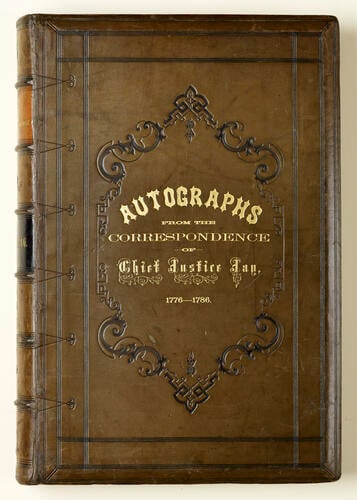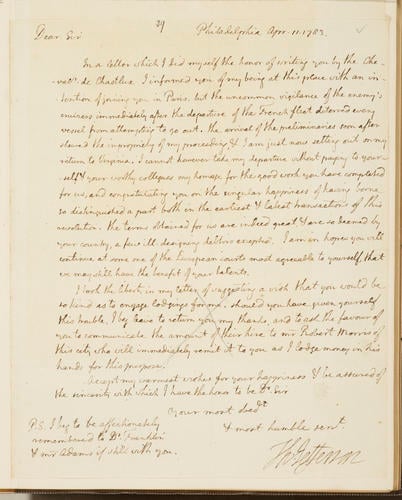-
1 of 253523 objects
Autograph letters from the correspondence of John Jay ... from 1776 to 1794 : bearing upon the American Revolution, and the treaties between the United States and Great Britain negociated by Jay in 1793 and 1794. 1776-94
35.5 x 4.5 cm (book measurement (inventory)) | RCIN 1047551

John Jay (1748-1829)
Autograph letters from the correspondence of John Jay . . . from 1776 to 1794 : bearing upon the American Revolution, and the treaties between the United States and Great Britain negociated by Jay in 1793 and 1794 1776-94


-
John Jay (1745–1829) was a lawyer and a statesman, who from 1781 to 1784, had been the leading United States Commissioner treating with Great Britain for peace during the American War of Independence. From 1784 to 1788, he was the Secretary of State for Foreign Affairs and, like George Washington, strongly advocated a federal constitution. In 1789, the newly-elected President Washington appointed Jay as Chief Justice of the Supreme Court, and Jay served as Governor of New York from 1795 until his retirement in 1801. In 1794, Jay was sent to Britain to negotiate a treaty with the British government in order to relieve tensions between the two nations. Known as the 'Jay Treaty' this agreement, while unpopular with France and many in the United States of America, avoided war with Britain and resolved issues that had remained undefined in the 1783 Treaty of Paris.
This volume of John Jay’s correspondence during the war and the formative years of the new nation was presented to Albert Edward, Prince of Wales (later King Edward VII) during his visit to the United States in 1860. At that time the prince used one of his lesser titles, Lord Renfrew, as an incognito. The flyleaf of the volume is inscribed: ‘For, Lord Renfrew, with the compliments of John Jay. The Jay Homestead, Bedford, Westchester County, Newyork. October 10. 1860.’ Written by many of the Founding Fathers of the United States, the letters cover an array of topics, from George Washington's memorandum informing Jay of the defeat of General Cornwallis at Yorktown in 1781, John Adams's assertions that peace negotiations should only proceed if the British were willing to acknowledge American independence to Alexander Hamilton's concerns over internal divisions regarding the governance of the new nation.
Contents:
1. Letter from James Duane dated Philadelphia, 11 May 1776, informing Jay that a committee of Congress has passed a resolution advising the thirteen colonies assume all the powers of government.
2. Letter from Robert Livingston dated Philadelphia, 11 June 1776, informing Jay of the preparations to gather militia for the defence of New York, requesting if Jay could recruit men from the Green Mountain Boys of Vermont.
3. Letter from Robert Morris, dated Philadelphia 1 April 1777, informing Jay of the receipt of new arms for the militia and a French loan of 2 million livres to assist in the war effort.
4. Letter from George Clinton, dated Poughkeepsie 29 April 1778, regarding Lord North's speech to the House of Commons on the war in America.
5. Letter from M. Gérard dated Philadelphia 12 December 1778, regarding opinions of America and the American cause in Europe.
6. Letter from Gouverneur Morris dated York Town, 3 May 1778, congratulating Jay on negotiating the alliance with France and remarks on the American response to North's speech.
7. Letter from George Washington dated Head Quarters, Middlebrook, May 10 1779, conveying to Jay his worries about American finances and the ability to continue the war if the British have a successful summer expedition.
8. Letter from Rufus King dated London, May 18 1779, regarding the situation in Europe & British enthusiasm for the war effort against France
9. Letter from Alexander Hamilton, dated Head Quarters, March 14 1779, regarding the raising of slave soldiers for the southern campaign and remarks on the treatment of black people in the country, suggesting service could lead to emancipation.
10. Letter from George Washington dated West Point, September 7 1779, regarding possible British allies in Europe and the balance of power on the continent.
11. Letter from Benjamin Franklin dated Passy, June 2 1779, remarking on proposals to invade Canada and advising against it. Informing Jay of British apprehension over war with Spain and their preparations for the summer expedition.
12. Draft letter from John Jay to Benjamin Franklin, dated Madrid, 28 March 1781 on the dire financial situation in America.
13. Letter from Benjamin Franklin dated Passy, June 30 1781 on the American finances
14. Letter from José Meñino, Count of Floridablanca, dated 26 November 1781.
15. Duplicate letter from William Livingston, dated Trenton, 21 August 1781 to Sarah Jay, on the campaign in the southern states, finances, Washington's campaign in New York and hopes that victory in New York will lead to British surrender.
16. Letter from the Comte de Montmorin, dated Madrid 17 April 1781.
17. Letter from Samuel Huntingdon, dated Philadelphia, July 5 1781, informing Jay of his selection, along with Benjamin Franklin and John Adams to negotiate the peace settlement.
18. Letter from George Washington to John Jay, dated 22 October 1781, after the defeat of the British forces at Yorktown.
19. Draft letter by Jay to Robert Morris dated Madrid, 25 April 1782 reflecting on his time in Spain and on Spanish manners and customs
20. Letter from the Marquis de Lafayette dated Versailles, January 30 1782, informing Jay of an attempted invasion of the United States from Canada and of remaining British strongholds.
21. Letter from the Marquis d'Yranda dated Madrid, 29 March 1782.
22. Letter from the Marchioness de Lafayette to Sarah Jay, dated Paris, 11 October 1782
23. Letter from John Adams dated The Hague, 13 August 1782 stating that negotiations should only begin if American independence is acknowledged.
24. Letter from Benjamin Franklin dated Passy, 22 April 1782, asking Jay to leave Spain and come to France.
25. Invitation from the comte d'Estaing requesting Jay meet Benjamin Franklin for dinner, dated 2 July 1782.
26. Letter from Benjamin Franklin, dated Passy, April 24 1782, regarding British release of prisoners of war and American reciprocation. Hopes treaty will soon be signed.
27. John Jay's invitation to go to Versailles to sign the peace treaty with Britain, 3 September 1783. Dated 28 August 1783.
28. Draft letter from Jay to Alexander Hamilton dated 28 September 1783 expressing concern at the instability and conflict in the United States now independence has been achieved.
29. Letter from Thomas Jefferson dated Philadelphia 11 April 1783 sending congratulations for Jay's efforts in negotiating peace.
30. Letter from Philip Schuyler dated Albany 1 July 1783 stating pleasure with the provisional draft of the treaty with Britain and informing Jay of the disbanding of the US army.
31. Letter from Alexander Hamilton dated Philadelphia July 25 1783, congratulating Jay on his efforts negotiating the treaty with Britain, informing Jay of New England granting an annual fish offering in thanks of his efforts, expressing concern at the internal conflict in the United States.
32. Draft letter from Jay to the Marquis de Lafayette dated Rouen, 19 Jun 1783, acknowledging his assistance in the war.
33. Letter from Gouverneur Morris dated Philadelphia, 10 January 1784 on European knowledge of American and the problems of luxury.
34. Letter from Richard Oswald dated London 27 February 1784, regarding stowaway American sailors captured on British vessels in the Caribbean.
35. Draft letter from Jay to David Hartley on his leaving Europe for America, thanking him for his hospitality in England, dated Chaillot, 22 February 1784
36. Draft letter from Jay to Dr Witherspoon, dated Chaillot 6 April 178[4] regarding the impropriety of Americans seeking donations in Britain.
37. Letter from Henry Laurens, dated Bath, 11 April 1784 announcing the receipt of the ratified treaty from Congress and its passing to David Hartley.
38. Letter from Henry Laurens to David Hartley dated 7 April 1784, announcing the arrival of a message that Congress has ratified the treaty with Britain.
39. Letter from David Hartley to Jay, dated London March 2 1784, in reply to Jay's letter of 22 February 1784.
40. Letter from Philip Schuyler dated New York, February 18 1784 on public sentiment in the United States.
41. Letter from John Paul Jones dated Paris, May 15 1784 regarding prisoners of war at Les Invalides.
42. Letter from Charles Thomson dated Philadelphia, July 29 1784 informing Jay of his election to the post of Secretary of Foreign Affairs.
43. Letter from John Trumbull dated New York, 21 April 1794 agreeing to accompany Jay on his visit to London.
44. Letter from George Washington dated Philadelphia, August 30 1794 on British occupation of military posts along the Canadian border and in the Northwest Territories.
45. Letter from Lord Mornington dated Brighthelmstone September 25 1794 asking for Jay's assistance in negotiating the release from France of his children, Sir Henry Wellesley and Anne Wellesley following their imprisonment near Lisbon.
46. Memorandum in French from Lord Mornington dated London September 25 1794 regarding the imprisonment of his children, Sir Henry Wellesley and Anne Wellesley.
47. Letter from William Grenville, Prime Minister of Great Britain dated Downing Street, 19 November 1794 regarding sending documents of property lost by British citizens following the war and the signing of the peace treaty.
48. Draft letter from Jay to Lord Grenville dated Royal Hotel, Pall Mall 27 October 1794, to pass on thanks following an audience with George III.
49. Letter from John Quincy Adams dated The Hague, November 14 1794, asking Jay to send letters from him to America and commenting on the situation of the country under French occupation.
50. Draft letter from Jay to Lord Grenville regarding the drafts of the proposed treaty between Britain and America dated Royal Hotel, Pall Mall, 30 September 1794.
51. Draft letter from Jay to Alexander Hamilton dated London, 19 November 1794 informing him that the treaty has been sent for ratification, expressed hope it will be passed.
52. Letter from Edmund Randolph dated Philadelphia December 23 1794 declining, for political reasons, Jay's recommendation of three French ambassadors.
53. Letter from Thomas Pinckney dated Cumberland Place 20 November 1794 congratulating Jay on his negotiations of the treaty.
54. Draft letter from Jay to George Washington, dated New York 23 Sept 1791 giving political advice on revenue, Native Americans, settlement, infrastructure, foreign policy, judicial system and census.
55. Letter from Thomas Jefferson dated Monticello, February 14 1790 on the appointment of secretaries.
56. Letter from George Washington dated Mount Vernon 15 August 1786 on the state of the United States, the people and the organisation of government.
Provenance
Presented to Edward VII as Prince of Wales (travelling incognito as Lord Renfrew) by John Jay, 16 Oct 1860.
-
Creator(s)
(contributor)(contributor) -
Measurements
35.5 x 4.5 cm (book measurement (inventory))
Category
Subject(s)